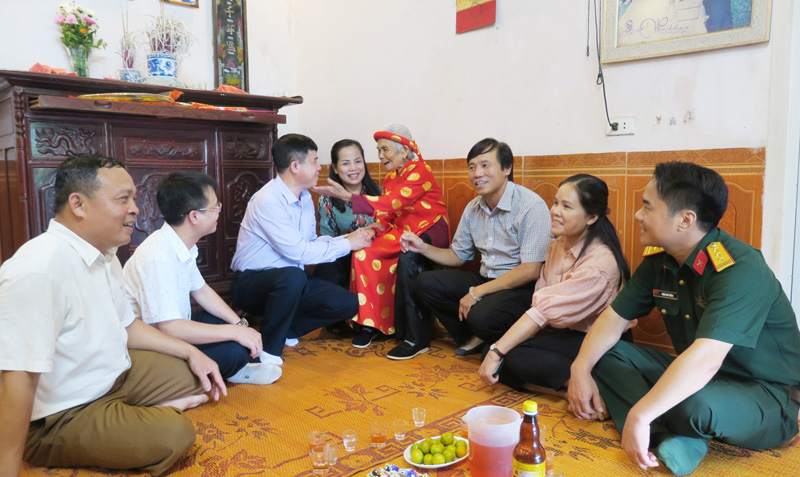
(HBO) – Authorities and people in Hoa Binh province has joined hands to pay tribute to martyrs, invalids and those who rendered services to the nation.
 Representatives from the
Fatherland Front Committee and authorities of Hoa Binh city visit
Heroic Vietnamese Mother Nguyen Thi Su in Xa Muc village,
Thinh Minh commune.
Representatives from the
Fatherland Front Committee and authorities of Hoa Binh city visit
Heroic Vietnamese Mother Nguyen Thi Su in Xa Muc village,
Thinh Minh commune.
To date, 99
percent of the province’s policy beneficiary families have reached the local average
living standards while all communes, wards and townships have provided good
support for relatives of martyrs, invalids, people rendering services to the country. About 1 percent, or 158
policy beneficiary households, are living below the local average living standards,
mainly because they are the elderly, people with sickness or without a
breadwinner.
According to
leaders of the provincial Department of Labour, Invalids and Social Affairs, to
promote local campaigns to pay tribute to martyrs, invalids and contributors
to the revolution, it is necessary
to strengthen Party and government leadership and coordination among local
departments and agencies in carrying out support policies for these people.
It is also
important to educate people, particularly young generations, on the country’s tradition of "When
drinking water, remember its source,” and step up emulation movements in implementing support
policies./.
Hoa Binh province is undergoing a dynamic transformation amid Vietnam’s national digital transition. Building on Poliburo’s Resolution No. 57-NQ/TW on breakthroughs in science, technology, innovation, and national digital transformation, the province has rolled out a wide range of practical action plans. A standout initiative is the "Digital Literacy for All” movement, an effort to ensure that no one is left behind in the digital era.
Hoa Binh province is undergoing a dynamic transformation in the wake of the national digital transformation movement. Building on Resolution No. 57-NQ/TW of the Politburo on breakthroughs in science, technology, innovation, and national digital transformation, the province has implemented a wide range of practical action plans. A standout initiative is the "Digital Literacy for All” movement ambitious effort to ensure that no one is left behind in the digital age.
With a spirit of unity and proactive problem-solving, the Party Committee, the government and the people of Dong Lai Commune (Tan Lac District) have made great strides in implementing the resolutions of the 24th Party Congress of the commune for the 2020 - 2025 term. Focusing on leadership and practical actions, the commune has brought the Party’s resolutions into daily life, creating strong impacts and pushing the local development forward.
Amid the nationwide push for digital transformation, young people in Hoa Binh Province are stepping up as dynamic pioneers, applying technology to enhance Youth Union operations and expand the reach of youth-led initiatives. Through creativity and adaptability, Youth Union organizations at all levels have introduced a series of practical solutions, contributing to modern governance and community development.
In recent years, An Nghia commune, located in Lac Son district, has stepped up administrative reform, focusing on improving the quality and efficiency of its single-window service unit for receiving and processing administrative procedures. These improvements have helped create favourable conditions for local residents and organisations to handle administrative procedures, contributing to the commune’s broader socio-economic development.
The Prime Minister-approved master plan to develop the multi-use value of forests ecosystems through 2030, with a vision to 2050, aims to improve the management and sustainable use of forest resources, create jobs, increase incomes, and improve the living standards of ethnic minorities, people in mountainous and remote areas, forest workers and those living near forests.



 Representatives from the
Fatherland Front Committee and authorities of Hoa Binh city visit
Heroic Vietnamese Mother Nguyen Thi Su in Xa Muc village,
Thinh Minh commune.
Representatives from the
Fatherland Front Committee and authorities of Hoa Binh city visit
Heroic Vietnamese Mother Nguyen Thi Su in Xa Muc village,
Thinh Minh commune.